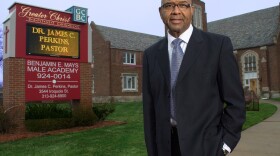
Tom Gjelten
Tom Gjelten reports on religion, faith, and belief for NPR News, a beat that encompasses such areas as the changing religious landscape in America, the formation of personal identity, the role of religion in politics, and conflict arising from religious differences. His reporting draws on his many years covering national and international news from posts in Washington and around the world.
In 1986, Gjelten became one of NPR's pioneer foreign correspondents, posted first in Latin America and then in Central Europe. Over the next decade, he covered social and political strife in Central and South America, the first Gulf War, the wars in the former Yugoslavia, and the transitions to democracy in Eastern Europe and the former Soviet Union.
His reporting from Sarajevo from 1992 to 1994 was the basis for his book Sarajevo Daily: A City and Its Newspaper Under Siege (HarperCollins), praised by the New York Times as "a chilling portrayal of a city's slow murder." He is also the author of Professionalism in War Reporting: A Correspondent's View (Carnegie Corporation) and a contributor to Crimes of War: What the Public Should Know (W. W. Norton).
After returning from his overseas assignments, Gjelten covered U.S. diplomacy and military affairs, first from the State Department and then from the Pentagon. He was reporting live from the Pentagon at the moment it was hit on September 11, 2001, and he was NPR's lead Pentagon reporter during the early war in Afghanistan and the invasion of Iraq. Gjelten has also reported extensively from Cuba in recent years. His 2008 book, Bacardi and the Long Fight for Cuba: The Biography of a Cause (Viking), is a unique history of modern Cuba, told through the life and times of the Bacardi rum family. The New York Times selected it as a "Notable Nonfiction Book," and the Washington Post, Kansas City Star, and San Francisco Chronicle all listed it among their "Best Books of 2008." His latest book, A Nation of Nations: A Great American Immigration Story (Simon & Schuster), published in 2015, recounts the impact on America of the 1965 Immigration Act, which officially opened the country's doors to immigrants of color. He has also contributed to The New York Times, The Wall Street Journal, The Washington Post, The Atlantic, and other outlets.
Since joining NPR in 1982 as labor and education reporter, Gjelten has won numerous awards for his work, including two Overseas Press Club Awards, a George Polk Award, and a Robert F. Kennedy Journalism Award. He is a member of the Council on Foreign Relations. A graduate of the University of Minnesota, he began his professional career as a public school teacher and freelance writer.
-
Collins, a top scientist and evangelical Christian, says, "The realization that principles of faith and science are complementary has been of great comfort to me in the search for truth."
-
The closure of churches due to the coronavirus could have long-lasting effects on congregations. Some people say they have become more connected with their faith, while others may be drifting away.
-
President Trump aims to rally U.S. Catholics to support his reelection. The effort is dividing Catholics along partisan lines and within congregations.
-
Most U.S Christians say their faith has been unaffected by the coronavirus. Those who attend historically black churches are the exception.
-
With the vast majority of U.S. churches closed and the country in a deep recession, church finances are in peril. Some are seeking government money through a new SBA program.
-
Government orders to restrict religious gatherings have emerged as a new religious freedom issue. Churches have filed lawsuits claiming that such restrictions violate the First Amendment.
-
Religious groups have gotten creative since the pandemic has forced millions to stay at home. NPR's religion correspondent answers listener questions about how religious practices are being reshaped.
-
The Pulitzer Prize-winning poet says "The chief task of the poet is to look closely at places that are often ignored or disregarded." She sees that come into play in some listener-submitted poems.
-
The county sheriff said Rodney Howard-Browne's "reckless disregard for human life put hundreds of people in his congregation at risk." He has questioned the seriousness of the coronavirus threat.
-
Many churches have moved worship services online, but there are some problems technology can't solve. Pastoral associate Kathie Amidei says she must find new ways "to be a conduit of God's love."





